- Browse
- Statistical Inference
Results for "statistical inference"
 Status: Free TrialFree TrialJ
Status: Free TrialFree TrialJJohns Hopkins University
Skills you'll gain: Statistical Inference, Statistical Hypothesis Testing, Probability & Statistics, Probability, Statistics, Bayesian Statistics, Statistical Methods, Statistical Modeling, Statistical Analysis, Probability Distribution, Sampling (Statistics), Sample Size Determination, Data Analysis
4.2·Rating, 4.2 out of 5 stars4.5K reviewsMixed · Course · 1 - 4 Weeks
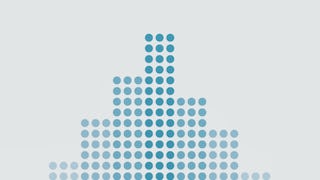 Status: Free TrialFree TrialD
Status: Free TrialFree TrialDDuke University
Skills you'll gain: Statistical Hypothesis Testing, Statistical Inference, Statistical Reporting, R (Software), Statistical Methods, Statistics, R Programming, Statistical Analysis, Probability & Statistics, Data Analysis, Sampling (Statistics), Probability Distribution, Software Installation
4.8·Rating, 4.8 out of 5 stars2.8K reviewsBeginner · Course · 1 - 3 Months
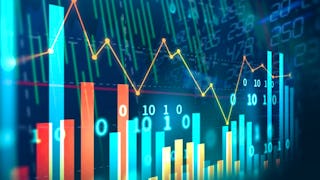 Status: NewNewStatus: Free TrialFree TrialA
Status: NewNewStatus: Free TrialFree TrialAArizona State University
Skills you'll gain: Statistical Methods, Bayesian Statistics, Statistics, Probability & Statistics, Data Storage Technologies, Analytical Skills, Exploratory Data Analysis, Data Storage, Database Software, Estimation, Data-Driven Decision-Making, Applied Machine Learning, Supervised Learning, Markov Model, Logistic Regression, Statistical Hypothesis Testing, Predictive Modeling, Simulations, Simulation and Simulation Software, Regression Testing
Intermediate · Specialization · 3 - 6 Months
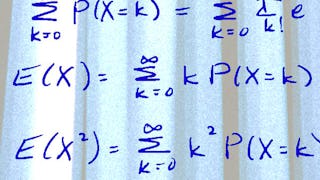 Status: Free TrialFree TrialU
Status: Free TrialFree TrialUUniversity of Colorado Boulder
Skills you'll gain: Probability, Statistical Hypothesis Testing, Statistical Inference, Statistical Methods, Probability & Statistics, Statistics, Probability Distribution, Data Literacy, Sampling (Statistics), Bayesian Statistics, Applied Mathematics, Data Ethics, Statistical Analysis, Quantitative Research, Data Science, Theoretical Computer Science, Data Analysis, Sample Size Determination, Descriptive Statistics, Artificial Intelligence
Build toward a degree
4.4·Rating, 4.4 out of 5 stars350 reviewsIntermediate · Specialization · 3 - 6 Months
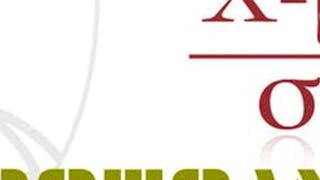 Status: Free TrialFree TrialJ
Status: Free TrialFree TrialJJohns Hopkins University
Skills you'll gain: Statistical Hypothesis Testing, Sampling (Statistics), Regression Analysis, Bayesian Statistics, Statistical Analysis, Probability & Statistics, Statistical Inference, Statistical Methods, Statistical Modeling, Linear Algebra, Probability, Probability Distribution, R Programming, Biostatistics, Data Science, Statistics, Mathematical Modeling, Data Analysis, Data Modeling, Applied Mathematics
4.4·Rating, 4.4 out of 5 stars787 reviewsAdvanced · Specialization · 3 - 6 Months
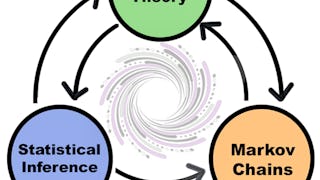 Status: NewNewStatus: Free TrialFree TrialU
Status: NewNewStatus: Free TrialFree TrialUUniversity of Colorado Boulder
Skills you'll gain: Probability, Statistical Inference, Estimation, Statistical Methods, Probability & Statistics, Statistics, Probability Distribution, Markov Model, Data Literacy, Statistical Analysis, Sampling (Statistics), Bayesian Statistics, Applied Mathematics, Artificial Intelligence, Generative AI, Data Science, Theoretical Computer Science, Data Analysis, Machine Learning Algorithms, Mathematical Theory & Analysis
Build toward a degree
4.4·Rating, 4.4 out of 5 stars338 reviewsIntermediate · Specialization · 3 - 6 Months
What brings you to Coursera today?
 Status: Free TrialFree TrialU
Status: Free TrialFree TrialUUniversity of Michigan
Skills you'll gain: Statistical Hypothesis Testing, Sampling (Statistics), Statistical Modeling, Statistical Methods, Statistical Inference, Bayesian Statistics, Data Visualization, Plot (Graphics), Data Literacy, Statistics, Matplotlib, Statistical Software, Probability & Statistics, Model Evaluation, Seaborn, Statistical Analysis, Jupyter, Statistical Programming, Statistical Machine Learning, Python Programming
4.6·Rating, 4.6 out of 5 stars3.3K reviewsBeginner · Specialization · 1 - 3 Months
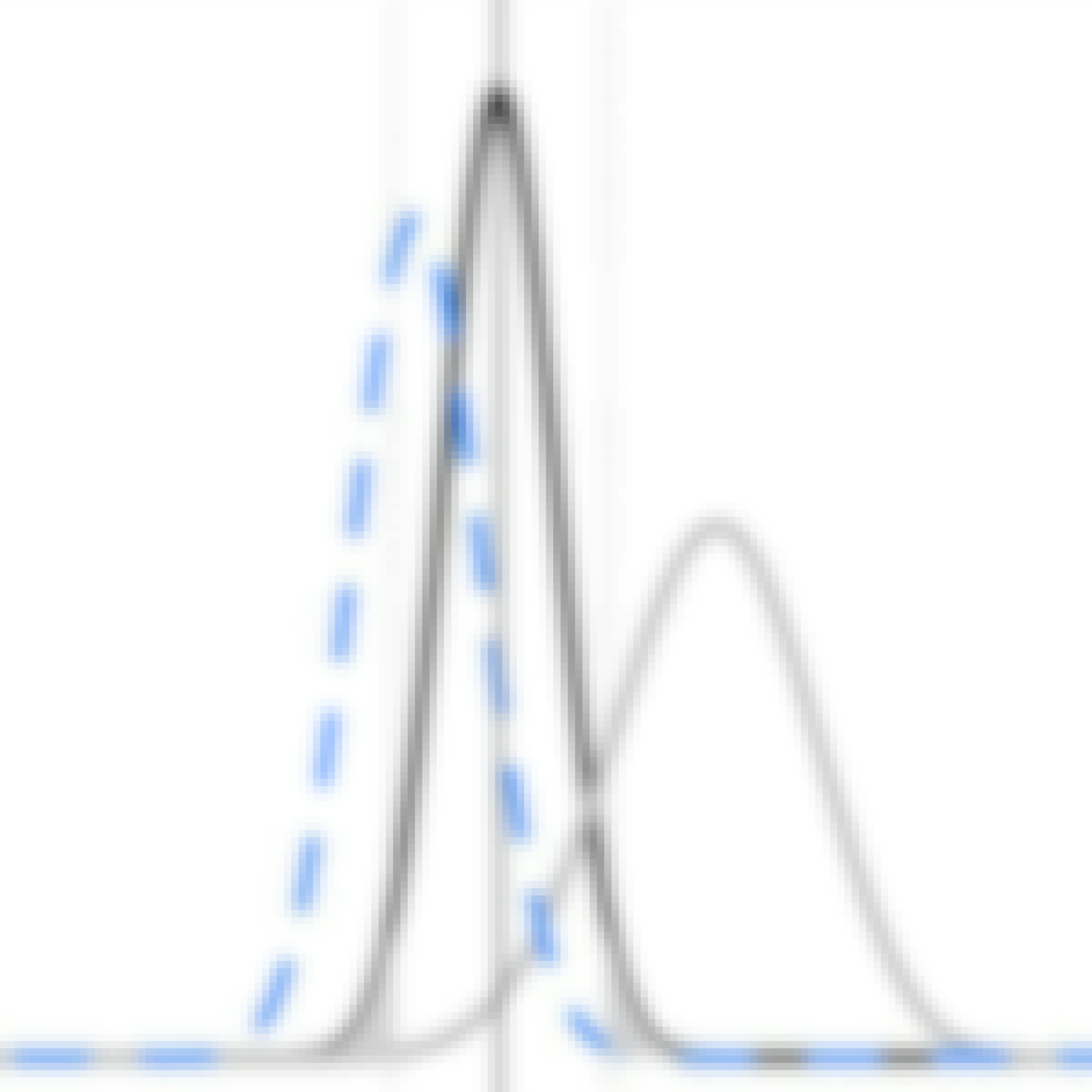 Status: PreviewPreviewE
Status: PreviewPreviewEEindhoven University of Technology
Skills you'll gain: Statistical Inference, Scientific Methods, Statistical Hypothesis Testing, Quantitative Research, Bayesian Statistics, Statistical Analysis, Probability & Statistics, Sample Size Determination, Research, R Programming, Data Sharing
4.9·Rating, 4.9 out of 5 stars800 reviewsIntermediate · Course · 1 - 3 Months
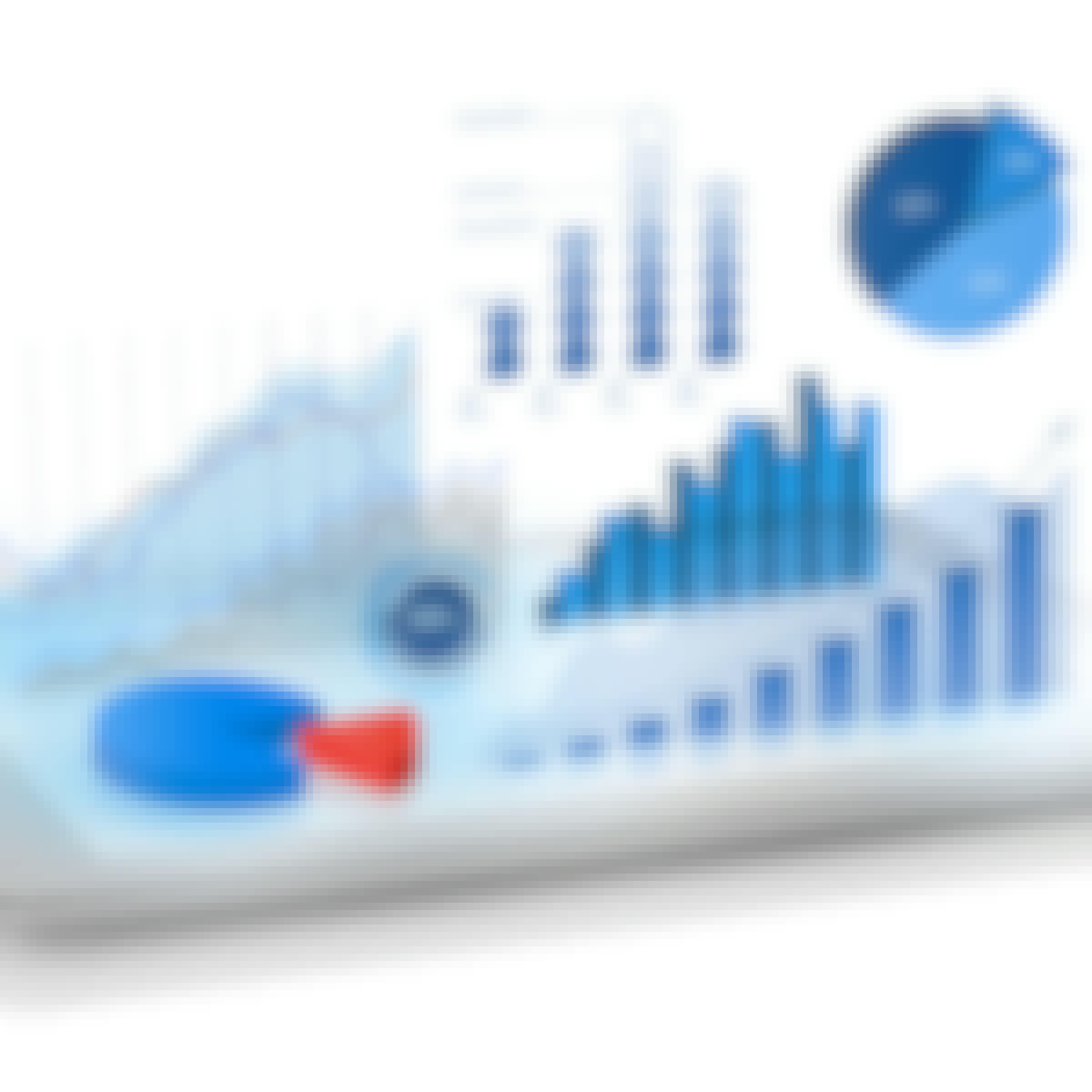 Status: NewNewStatus: Free TrialFree TrialA
Status: NewNewStatus: Free TrialFree TrialAArizona State University
Skills you'll gain: Probability & Statistics, Analytical Skills, Exploratory Data Analysis, Estimation, Logistic Regression
Intermediate · Course · 1 - 3 Months
 Status: PreviewPreviewS
Status: PreviewPreviewSStanford University
Skills you'll gain: Descriptive Statistics, Statistics, Statistical Methods, Sampling (Statistics), Statistical Analysis, Data Analysis, Statistical Modeling, Statistical Hypothesis Testing, Regression Analysis, Statistical Inference, Probability, Exploratory Data Analysis, Quantitative Research, Probability Distribution
4.6·Rating, 4.6 out of 5 stars4.3K reviewsBeginner · Course · 1 - 3 Months
 Status: Free TrialFree Trial
Status: Free TrialFree TrialSkills you'll gain: Data Visualization, Descriptive Statistics, Regression Analysis, Forecasting, Business Analytics, Data Analysis, Statistical Analysis, Statistical Methods, Microsoft Excel, Statistics, Spreadsheet Software, Predictive Analytics, Probability
4.6·Rating, 4.6 out of 5 stars139 reviewsIntermediate · Course · 1 - 3 Months
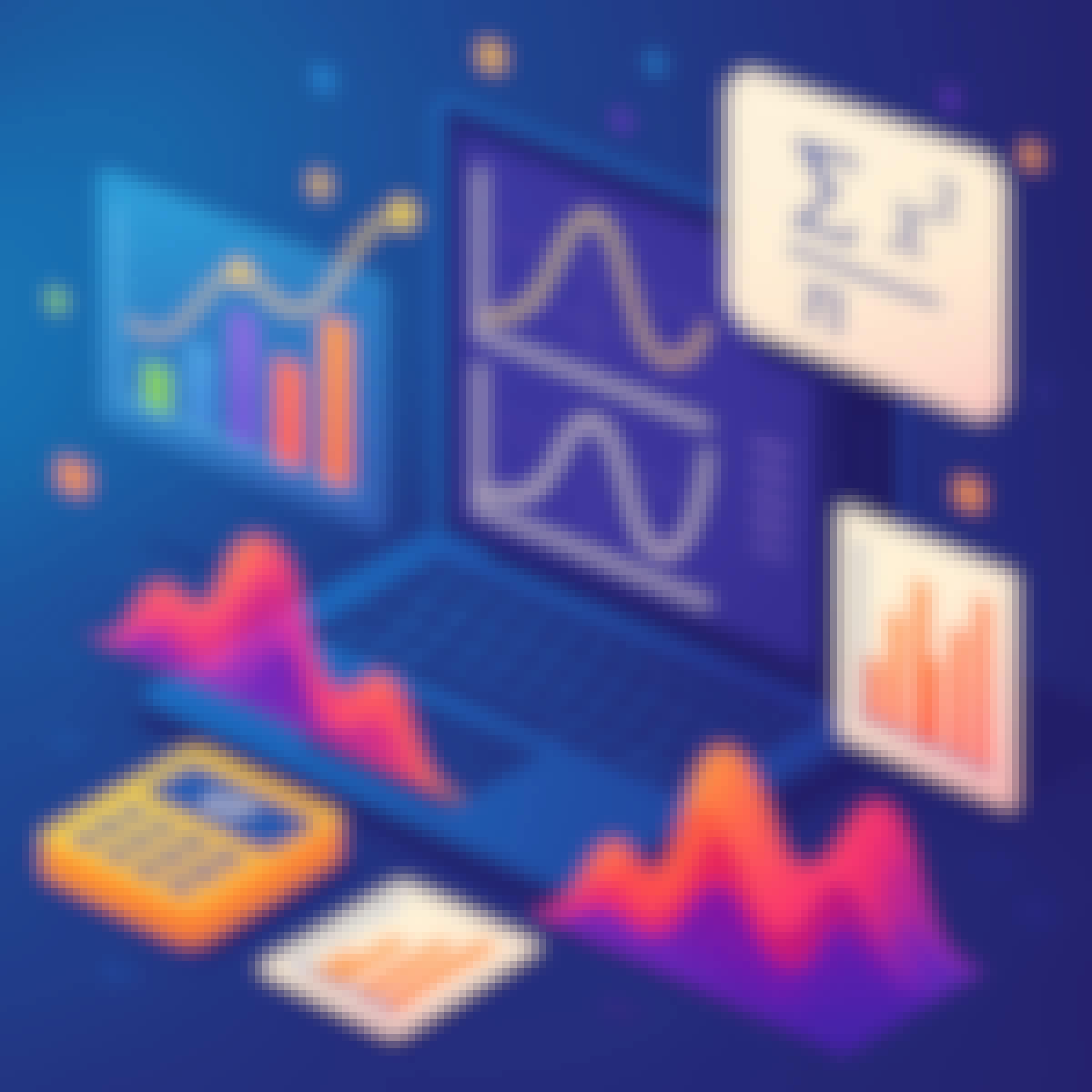 Status: Free TrialFree TrialU
Status: Free TrialFree TrialUUniversity of Pittsburgh
Skills you'll gain: Statistical Analysis, Statistical Modeling, Predictive Modeling, Data Analysis, Statistics, Integral Calculus, Probability & Statistics, Data Science, Probability Distribution, Calculus, Mathematics and Mathematical Modeling, Applied Mathematics, Derivatives, Mathematical Modeling, Machine Learning, Algorithms
Build toward a degree
Beginner · Course · 1 - 4 Weeks
Searches related to statistical inference
In summary, here are 10 of our most popular statistical inference courses
- Statistical Inference: Johns Hopkins University
- Inferential Statistics: Duke University
- Modern Statistics for Data-Driven Decision-Making: Arizona State University
- Data Science Foundations: Statistical Inference: University of Colorado Boulder
- Advanced Statistics for Data Science: Johns Hopkins University
- Foundations of Probability and Statistics: University of Colorado Boulder
- Statistics with Python: University of Michigan
- Improving your statistical inferences: Eindhoven University of Technology
- Probability, Statistical Inference and Regression Analysis: Arizona State University
- Introduction to Statistics: Stanford University
Frequently Asked Questions about Statistical Inference
Statistical inference is a branch of statistics that allows us to make conclusions about a population based on a sample of data. It involves using data analysis to estimate population parameters, test hypotheses, and make predictions. Understanding statistical inference is crucial because it provides the tools to make informed decisions in various fields, including business, healthcare, and social sciences. By applying statistical inference, organizations can identify trends, assess risks, and improve outcomes based on data-driven insights.
Careers in statistical inference span a wide range of industries. Positions such as data analyst, statistician, biostatistician, and quantitative researcher often require strong skills in statistical inference. Additionally, roles in market research, quality assurance, and financial analysis also benefit from expertise in this area. As businesses increasingly rely on data to drive decisions, the demand for professionals skilled in statistical inference continues to grow.
To effectively learn statistical inference, you should focus on several key skills. First, a solid understanding of probability theory is essential, as it forms the foundation of statistical inference. Familiarity with statistical software, such as R or Python, is also important for data analysis. Additionally, skills in data visualization and interpretation will help you communicate your findings effectively. Lastly, critical thinking and problem-solving abilities are crucial for applying statistical methods to real-world scenarios.
There are several excellent online courses available for learning statistical inference. For a comprehensive introduction, consider the Statistical Inference course, which covers fundamental concepts and techniques. For those interested in data science applications, the Data Science Foundations: Statistical Inference Specialization offers a deeper dive into practical applications. Additionally, the Statistical Inference and Hypothesis Testing in Data Science Applications course focuses on hypothesis testing, a critical aspect of statistical inference.
Yes. You can start learning statistical inference on Coursera for free in two ways:
- Preview the first module of many statistical inference courses at no cost. This includes video lessons, readings, graded assignments, and Coursera Coach (where available).
- Start a 7-day free trial for Specializations or Coursera Plus. This gives you full access to all course content across eligible programs within the timeframe of your trial.
If you want to keep learning, earn a certificate in statistical inference, or unlock full course access after the preview or trial, you can upgrade or apply for financial aid.
To learn statistical inference effectively, start by selecting a course that matches your current knowledge level. Begin with foundational concepts, such as probability and descriptive statistics, before progressing to more advanced topics like hypothesis testing and confidence intervals. Engage with practical exercises and real-world datasets to apply what you learn. Additionally, participating in online forums or study groups can enhance your understanding and provide support as you navigate the material.
Typical topics covered in statistical inference courses include probability distributions, sampling methods, estimation techniques, hypothesis testing, confidence intervals, and regression analysis. Some courses may also explore advanced topics like Bayesian inference and statistical modeling. By covering these areas, learners gain a comprehensive understanding of how to analyze data and draw meaningful conclusions.
For training and upskilling employees in statistical inference, courses like the SAS Statistical Business Analyst Professional Certificate provide a structured approach to learning essential skills. Additionally, the Statistical Analysis with R for Public Health Specialization is ideal for those in the healthcare sector. These programs equip professionals with the necessary tools to apply statistical inference in their respective fields effectively.










